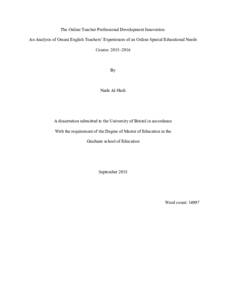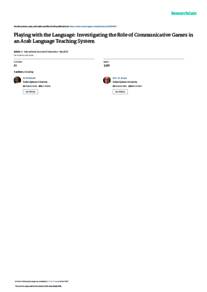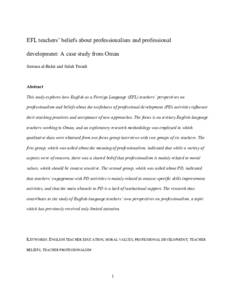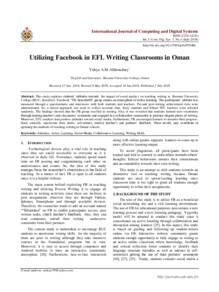وثيقة
The online teacher professional development innovation : an analysis of Omani English teachers’ experiences of an online special educational needs course : 2015–2016.
المصدر
Master's thesis
الدولة
England.
مكان النشر
Bristol
الناشر
University of Bristol.
ميلادي
2018
اللغة
الأنجليزية
الموضوع
نوع الرسالة الجامعية
Master's thesis
الملخص الإنجليزي
Synopsis
With the rapid proliferation of technology, online learning has spread remarkably, proving its
sustainability even in the field of teacher professional development (TPD). Oman, through its
Ministry of Education (MoE), has adopted several online initiatives thus far. Although online TPD
(OTPD) has spread markedly, little is known about the impact of such courses on Omani teachers.
This study is aimed to address this gap in the research by investigating the experiences of Omani
English teachers in one of the OTPD courses, Special Educational Needs (SEN). A qualitative
approach was applied in the study: five Omani English teachers who participated in the online
SEN course were interviewed. The content of the interviews was then analyzed using thematic
analysis. The data generated was used to answer the research questions from the perspective of the
social constructivism, based on the community of inquiry (CoI) framework.
The results reveal that several factors affect teachers’ learning in the online SEN course. These
factors are related to the three presences of the CoI framework: cognitive presence – content-based
learning, critical thinking learning based on communication and reflection, and self-directed
learning; social presence – interaction and communication; and teaching presence – course design,
the e-moderator’s role, materials, and teaching methods. The findings also indicate that the
teachers themselves play a crucial role in the success of their learning by being motivated and
having positive attitude towards the course.
The results also demonstrate that the teachers’ ability to transfer and sustain the knowledge gained
depends on both private factors, such as their attitude, responsibility, and perception of online
learning, interests, and needs; and public factors, such as supervision support, follow-up practices,
school structure, and school culture and context
قالب العنصر
الرسائل والأطروحات الجامعية




